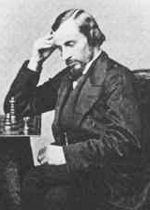Harrwitz Daniel (29.04.1883 – 09.01.1884)
 German player of Grandmaster’s strength who was one of the top 3 or 4 players in the world during the 1850s. ‘The modern generation’, said Emanuel Lasker in 1932, ‘fails to do justice to him. He was a great player’.
German player of Grandmaster’s strength who was one of the top 3 or 4 players in the world during the 1850s. ‘The modern generation’, said Emanuel Lasker in 1932, ‘fails to do justice to him. He was a great player’.
Harrwitz was born in Breslau and together with Adolf Anderssen, they were very famous in the city. Harrwitz trained as a book dealer but soon devoted himself entirely to chess. In 1845 he went to Paris where he was regarded as the equal of Lionel Kieserlitzky, and in 1846 they both went to London. There they took part in a triangular contest with Howard Staunton; each played the other two, Howard Staunton conceding odds of a rook, the others playing blindfold. Staunton defeated Lionel Kieseritzky, while Harrwitz, already an expert blindfold player, won both his games.
In 1845 he went to Paris where he was regarded as the equal of Lionel Kieserlitzky, and in 1846 they both went to London. There they took part in a triangular contest with Howard Staunton; each played the other two, Howard Staunton conceding odds of a rook, the others playing blindfold. Staunton defeated Lionel Kieseritzky, while Harrwitz, already an expert blindfold player, won both his games. In the same year Harrwitz lost a match to Staunton for 21 games up excluding draws: seven played level, seven at Pawn and Move and seven at Pawn and two Moves. (Staunton conceded the odds). Harrwitz scored –7, +6=1-1, and +3-4 respectively. It was his first big match, in which, curiously, he fared better with pawn and move than with pawn and two.
Although Harrwitz was not yet at his full strength Howard Staunton considered it his hardest match. Visiting Breslau in 1848 Harrwitz met Adolf Anderssen for the first time. He had been working in Berlin when Harrwitz first flourished. They played a match for 11 games up but when the score stood at five wins each they agreed to end the match. After Harrwitz lost the first game, he took five days off to recuperate. To avoid revolutionary turmoil Harrwitz left his home town shortly afterwards and returned to London. His next important match was in 1852 when he defeated Simon Williams (+7=3). He also defeated
His next important match was in 1852 when he defeated Simon Williams (+7=3). He also defeated opponent in matches in 1853, and in one of these, when he had suffered two losses, Harrwitz went to visit Hamburg before returning to finish the match. In the same year he played Johann Loewenthal for the first to win 11 games. When trailing badly (his score was +2=1-7) Harrwitz took himself to Brighton. Johann Loewenthal had provided for such eventuality in the conditions, and Harrwitz lost two games by default. Harrwitz returned, fought with great determination, and won (+11=12-10). There was much acrimony between rival supporters. One man hired an organ-grinder to play outside the window, knowing this would upset Johann Loewenthal more than Harrwitz, and another, defying the non-smoking rule, blew think cigar smoke into Loewenthal’s face. The gentle Johann Loewenthal was a surrogate for his chief supporter, Howard Staunton. Harrwitz had challenged Staunton, but had been unable to agree to terms, some blaming one party, some the other. Harrwitz beat Horwitz +6=1-5 (1846), +7=12-6 (1849), beat Jozef Szen +3=1-1 (1852).
Harrwitz had a high-strung nature and was not physically robust. When his health gave way he would withdraw from the chess scene until his vitality returned. In 1853 he founded the British Chess Review – quite a good magazine – to compete with Staunton’s Chess Chronicle. (‘To talk of the match between Messrs Loewenthal and Harrwitz, is just like speaking of the match between Mr. Harrwitz and the Wandering Jew.’) The English player Augustus Mongredien (1807-88), who knew Harrwitz, wrote: ‘he had the misfortunate of being both contentious and witty – the former quality involving him in constant disputes, and the latter rendering these disputes both bitter and personal.’ Staunton, of course, could well hold his own. He played in just one tournament – Manchester 1857 – a knockout affair. Unfortunately, he was paired with Anderssen in the first round and lost. He did win several offhand games against Anderssen and one with both players blindfold. Harrwitz then left England for Paris where he dominated the chess scene and was known as the King of the Café de la Régence.
In the fall of 1858, Paul Morphy came to Paris to play the King. Harrwitz won an offhand game and the first two games of their match. Then thins went Morphy’s way and Harrwitz resigned the match when the score was +2=1-5. In fact, this was quite a respectable result against the American genius, but it was Harrwitz’s first match defeat since his loss to Howard Staunton in 1846. In December 1858, inspired by Morphy’s blindfold displays, Harrwitz played 8 simultaneous blindfold games scoring +6=1-1 in 8 hours. But his star was waning. He lost +1=2-3 to Adolf Anderssen and could not hold his own against Baron Kolisch in late 1859.



